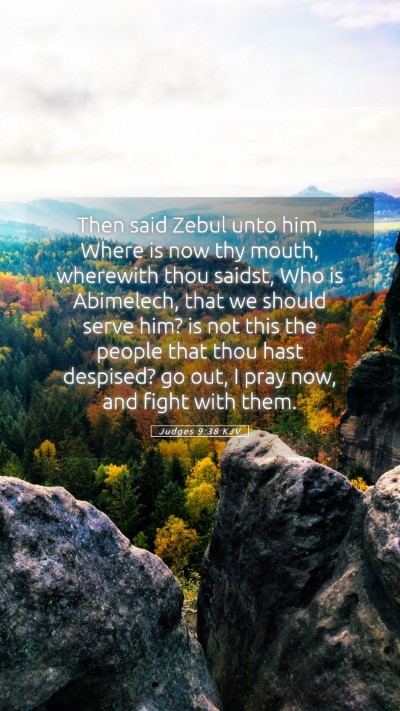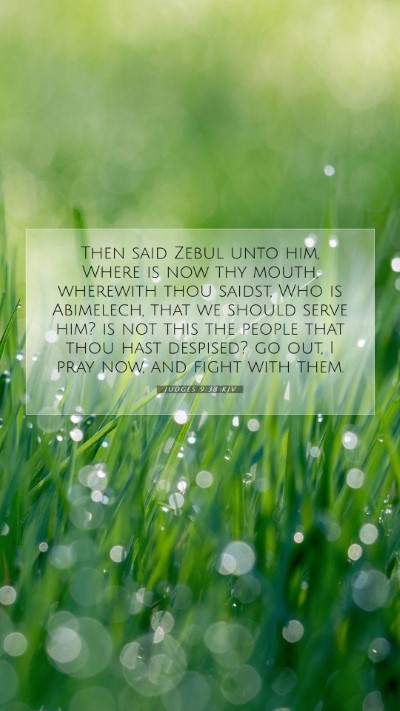Bible Verse Commentary: Judges 9:38
Judges 9:38 states: "Then said Zebul unto him, Now therefore up, and fight for thy country." This verse serves as a pivotal moment within the narrative, illustrating themes of loyalty, leadership, and the consequences of ambition. Below, we will explore the deeper meanings and interpretations of this passage sourced from public domain commentaries by Matthew Henry, Albert Barnes, and Adam Clarke.
Verse Summary and Context
The context of Judges 9 involves the rise to power of Abimelech, the son of Gideon, and his subsequent betrayal of the people of Shechem. Zebul is depicted as an officer of Abimelech, and his words indicate a call to arms to defend their homeland. This moment is crucial as it encapsulates the ensuing conflict arising from Abimelech's ambition to rule, leading to dire consequences for both himself and the people.
Interpretations and Insights
-
Matthew Henry's Commentary
Henry emphasizes the significance of Zebul’s statement, highlighting the duality of loyalty to one’s leader and one’s nation. He suggests that Zebul represents a conflicted loyalties, caught between fear of Abimelech and loyalty to the people. This illustrates the broader conflict between personal ambition and communal integrity.
-
Albert Barnes' Commentary
Barnes notes the pragmatic response of Zebul based on the circumstances, interpreting his exhortation as a rallying cry for the people. He acknowledges the moral decay evidenced in the choices made by both leaders and citizens. The quote invites readers to reflect on their own priorities and the implications of their commitments—whether to a leader or to the greater good of the society.
-
Adam Clarke's Commentary
Clarke offers a more historical lens, linking the events of Judges to the broader narrative of Israel's struggles for unity and integrity. He stresses that Zebul’s call to action serves not just as a command, but as a reflection of the chaotic moral landscape Israel faced during the Judges period. This point signifies the continual conflict between divine leadership versus human governance.
Key Themes
- Leadership and Responsibility: The verse underscores the responsibilities that come with leadership. Zebul's call to battle illustrates the expectation for leaders to inspire courage and unity in times of strife.
- Betrayal and Consequences: Abimelech's rise to power is stitched with betrayal. The repercussions of his ambition complicate the lives of those around him, making them vulnerable to violence and disorder.
- Community vs. Individual ambition: Zebul's insistence on action reflects a tension between community welfare and personal gains, prompting a reflection on the ethical dimensions of ambition.
Applications to Daily Life
For modern readers, the exhortation in Judges 9:38 can serve as a necessary reminder about the character and actions of leaders, the weight of community decisions, and the importance of evaluating our loyalties. It also encourages individuals to consider the larger implications of their decisions, promoting collective well-being over personal ambition.
Related Cross References
- Judges 8:30-31: The backstory of Abimelech's rise and Gideon's family dynamics.
- Judges 9:1-6: Abimelech’s initial claim to power and the conspiracy at Shechem.
- Matthew 20:25-28: New Testament reflections on leadership and servitude.


